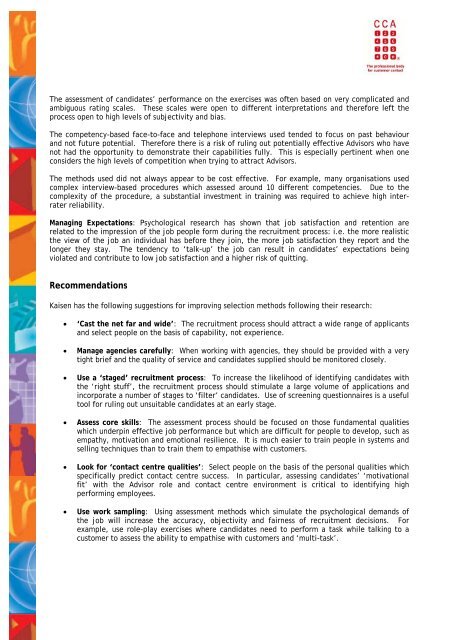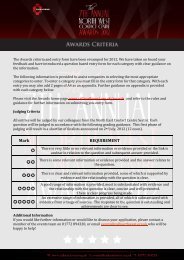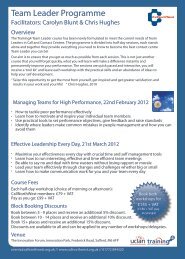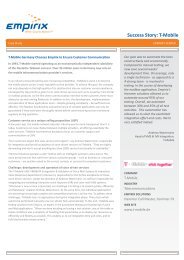Using Psychology to Get Contact Centres Right - CallNorthWest
Using Psychology to Get Contact Centres Right - CallNorthWest
Using Psychology to Get Contact Centres Right - CallNorthWest
You also want an ePaper? Increase the reach of your titles
YUMPU automatically turns print PDFs into web optimized ePapers that Google loves.
The assessment of candidates’ performance on the exercises was often based on very complicated andambiguous rating scales. These scales were open <strong>to</strong> different interpretations and therefore left theprocess open <strong>to</strong> high levels of subjectivity and bias.The competency-based face-<strong>to</strong>-face and telephone interviews used tended <strong>to</strong> focus on past behaviourand not future potential. Therefore there is a risk of ruling out potentially effective Advisors who havenot had the opportunity <strong>to</strong> demonstrate their capabilities fully. This is especially pertinent when oneconsiders the high levels of competition when trying <strong>to</strong> attract Advisors.The methods used did not always appear <strong>to</strong> be cost effective. For example, many organisations usedcomplex interview-based procedures which assessed around 10 different competencies. Due <strong>to</strong> thecomplexity of the procedure, a substantial investment in training was required <strong>to</strong> achieve high interraterreliability.Managing Expectations: Psychological research has shown that job satisfaction and retention arerelated <strong>to</strong> the impression of the job people form during the recruitment process: i.e. the more realisticthe view of the job an individual has before they join, the more job satisfaction they report and thelonger they stay. The tendency <strong>to</strong> ‘talk-up’ the job can result in candidates’ expectations beingviolated and contribute <strong>to</strong> low job satisfaction and a higher risk of quitting.RecommendationsKaisen has the following suggestions for improving selection methods following their research:• ‘Cast the net far and wide’: The recruitment process should attract a wide range of applicantsand select people on the basis of capability, not experience.• Manage agencies carefully: When working with agencies, they should be provided with a verytight brief and the quality of service and candidates supplied should be moni<strong>to</strong>red closely.• Use a ‘staged’ recruitment process: To increase the likelihood of identifying candidates withthe ‘right stuff’, the recruitment process should stimulate a large volume of applications andincorporate a number of stages <strong>to</strong> ‘filter’ candidates. Use of screening questionnaires is a useful<strong>to</strong>ol for ruling out unsuitable candidates at an early stage.• Assess core skills: The assessment process should be focused on those fundamental qualitieswhich underpin effective job performance but which are difficult for people <strong>to</strong> develop, such asempathy, motivation and emotional resilience. It is much easier <strong>to</strong> train people in systems andselling techniques than <strong>to</strong> train them <strong>to</strong> empathise with cus<strong>to</strong>mers.• Look for ‘contact centre qualities’: Select people on the basis of the personal qualities whichspecifically predict contact centre success. In particular, assessing candidates’ ‘motivationalfit’ with the Advisor role and contact centre environment is critical <strong>to</strong> identifying highperforming employees.• Use work sampling: <strong>Using</strong> assessment methods which simulate the psychological demands ofthe job will increase the accuracy, objectivity and fairness of recruitment decisions. Forexample, use role-play exercises where candidates need <strong>to</strong> perform a task while talking <strong>to</strong> acus<strong>to</strong>mer <strong>to</strong> assess the ability <strong>to</strong> empathise with cus<strong>to</strong>mers and ‘multi-task’.






